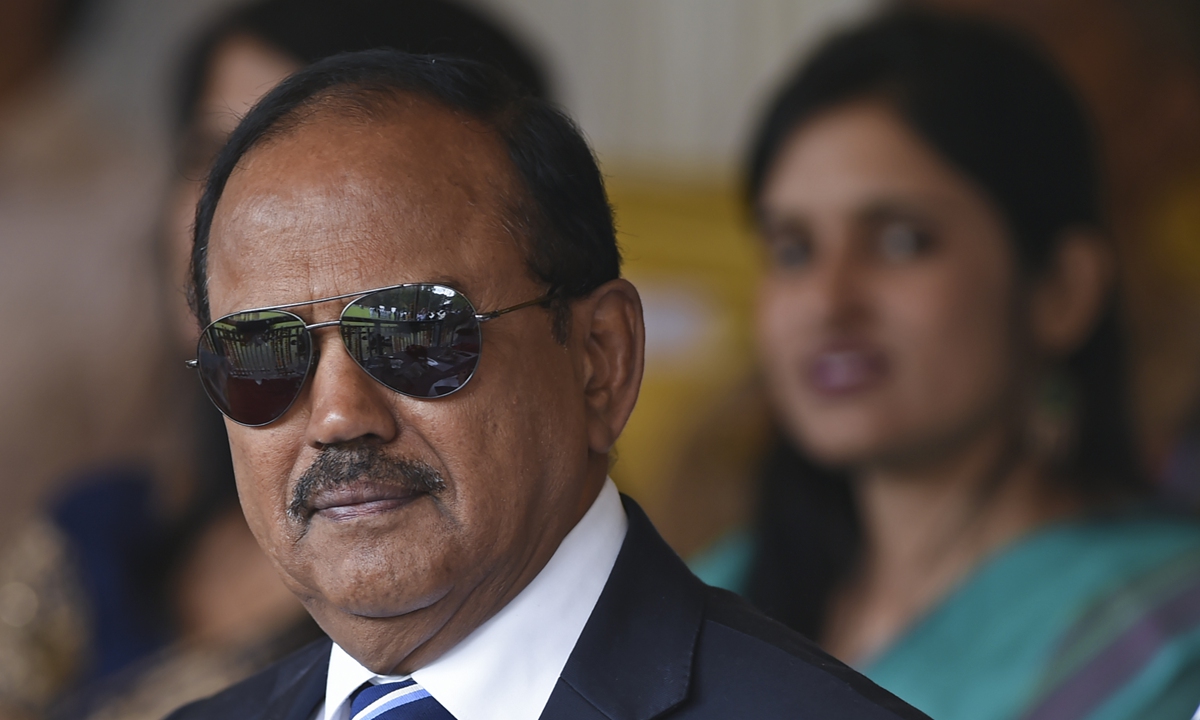India, cajoled by US, seeks to pressure small nations
By Lu Yuanzhi Source: Global Times Published: 2020/11/29 20:53:40

Ajit Doval Photo: AFP
Indian National Security Adviser (NSA) Ajit Doval visited Colombo on Friday and Saturday to participate in the fourth NSA Level Meeting on Trilateral Maritime Security Cooperation hosted by Sri Lanka.
However, Doval's visit was also to deepen India's cooperation with Sri Lanka. India sees China's coordination with Sri Lanka as somewhat breaking into India's sphere of influence. Furthermore, China-India ties have been gravely undermined because of their border tensions. In this context, India intends to exploit its advantages in geopolitics, culture and religion to rope in Sri Lanka to contain China, counter the China-proposed Belt and Road Initiative (BRI) and consolidate India's influence in South Asia.
The Diplomat magazine on Saturday said, "Even though Sri Lanka has rhetorically committed to an 'India first' approach when it comes to security, the fine print indicates that Colombo will engage with other major powers - read, China for its economic development."
China and Sri Lanka are good friends and partners who always support and help each other. The two countries have deepened their economic cooperation under the BRI framework.
By contrast, the story of New Delhi-Colombo ties is that of ups and downs. The two have frictions in areas such as the Tamil issue. Successive governments of both countries have tended to adjust policies toward each other based on the updated situations.
In recent years, India has repeated ly wooed Sri Lanka. In response, in order not to offend New Delhi, who acts as a hegemon in South Asia, Colombo has made overtures to please New Delhi. For example, Sri Lanka's foreign secretary Jayanath Colombage said in August that Sri Lanka will adopt an "India first approach" as its new diplomacy plank and protect India's strategic security interests, an attempt to ease India's concern over China's growing presence in Sri Lanka.
The island country is of great strategic importance, connecting the Strait of Malacca and the Persian Gulf. Additionally, Sri Lanka lies in the Indo-Pacific region, which has drawn global attention. Hence, Colombo has become a target for not only New Delhi's, but also Washington's machinations.
US Secretary of State Mike Pompeo in October visited Sri Lanka, where he groundlessly slandered China and attempted to drive a wedge between China and Sri Lanka. However, Sri Lankan President Gotabaya Rajapaksa responded that Sri Lanka is not caught in a "debt trap" by accepting help from China.
India, by ganging up with the US, is piling geopolitical pressure on small countries. Sri Lanka, like others involved in the fierce geopolitical competition, is pleased to have maintained long-term and close ties with China, which has never interfered in its internal affairs.
On the other hand, the wooing from the US and India has indeed exerted considerable pressure on these countries. They cannot afford to pay the price if they offend either the US or India. They try their best to strike a balance between great powers. Qian Feng, director of the research department of the National Strategy Institute at Tsinghua University, told the Global Times on Sunday that the pressure on Sri Lanka from the US and India may to some extent wield an impact on its ties with China.
From Bangladesh and Nepal to Sri Lanka, India recently seems to be busy with resetting, restoring and strengthening ties with its neighboring countries. Qian said that against the backdrop of ongoing border tensions with China, India hopes to expand its influence, in a bid to gain more strategic capital and room to maneuver with China.
South Asia plays a big role in the China-proposed BRI. China should continue to deepen its cooperation with regional countries on the basis of win-win principles. Qian said that India should not continue the geopolitical confrontation, but expand "China-India Plus" cooperation, which leaders of the two countries agreed to in 2019. This will be conducive to China, India and the whole South Asian region.
Posted in: OBSERVER